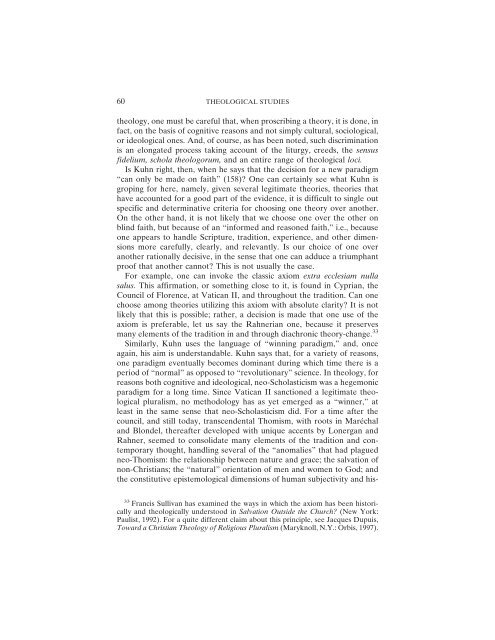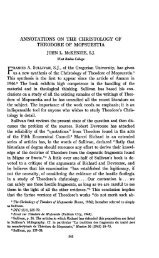rosmini, ratzinger, and kuhn - Theological Studies
rosmini, ratzinger, and kuhn - Theological Studies
rosmini, ratzinger, and kuhn - Theological Studies
You also want an ePaper? Increase the reach of your titles
YUMPU automatically turns print PDFs into web optimized ePapers that Google loves.
60 THEOLOGICAL STUDIES<br />
theology, one must be careful that, when proscribing a theory, it is done, in<br />
fact, on the basis of cognitive reasons <strong>and</strong> not simply cultural, sociological,<br />
or ideological ones. And, of course, as has been noted, such discrimination<br />
is an elongated process taking account of the liturgy, creeds, the sensus<br />
fidelium, schola theologorum, <strong>and</strong> an entire range of theological loci.<br />
Is Kuhn right, then, when he says that the decision for a new paradigm<br />
“can only be made on faith” (158)? One can certainly see what Kuhn is<br />
groping for here, namely, given several legitimate theories, theories that<br />
have accounted for a good part of the evidence, it is difficult to single out<br />
specific <strong>and</strong> determinative criteria for choosing one theory over another.<br />
On the other h<strong>and</strong>, it is not likely that we choose one over the other on<br />
blind faith, but because of an “informed <strong>and</strong> reasoned faith,” i.e., because<br />
one appears to h<strong>and</strong>le Scripture, tradition, experience, <strong>and</strong> other dimensions<br />
more carefully, clearly, <strong>and</strong> relevantly. Is our choice of one over<br />
another rationally decisive, in the sense that one can adduce a triumphant<br />
proof that another cannot? This is not usually the case.<br />
For example, one can invoke the classic axiom extra ecclesiam nulla<br />
salus. This affirmation, or something close to it, is found in Cyprian, the<br />
Council of Florence, at Vatican II, <strong>and</strong> throughout the tradition. Can one<br />
choose among theories utilizing this axiom with absolute clarity? It is not<br />
likely that this is possible; rather, a decision is made that one use of the<br />
axiom is preferable, let us say the Rahnerian one, because it preserves<br />
many elements of the tradition in <strong>and</strong> through diachronic theory-change. 33<br />
Similarly, Kuhn uses the language of “winning paradigm,” <strong>and</strong>, once<br />
again, his aim is underst<strong>and</strong>able. Kuhn says that, for a variety of reasons,<br />
one paradigm eventually becomes dominant during which time there is a<br />
period of “normal” as opposed to “revolutionary” science. In theology, for<br />
reasons both cognitive <strong>and</strong> ideological, neo-Scholasticism was a hegemonic<br />
paradigm for a long time. Since Vatican II sanctioned a legitimate theological<br />
pluralism, no methodology has as yet emerged as a “winner,” at<br />
least in the same sense that neo-Scholasticism did. For a time after the<br />
council, <strong>and</strong> still today, transcendental Thomism, with roots in Maréchal<br />
<strong>and</strong> Blondel, thereafter developed with unique accents by Lonergan <strong>and</strong><br />
Rahner, seemed to consolidate many elements of the tradition <strong>and</strong> contemporary<br />
thought, h<strong>and</strong>ling several of the “anomalies” that had plagued<br />
neo-Thomism: the relationship between nature <strong>and</strong> grace; the salvation of<br />
non-Christians; the “natural” orientation of men <strong>and</strong> women to God; <strong>and</strong><br />
the constitutive epistemological dimensions of human subjectivity <strong>and</strong> his-<br />
33 Francis Sullivan has examined the ways in which the axiom has been historically<br />
<strong>and</strong> theologically understood in Salvation Outside the Church? (New York:<br />
Paulist, 1992). For a quite different claim about this principle, see Jacques Dupuis,<br />
Toward a Christian Theology of Religious Pluralism (Maryknoll, N.Y.: Orbis, 1997).

















